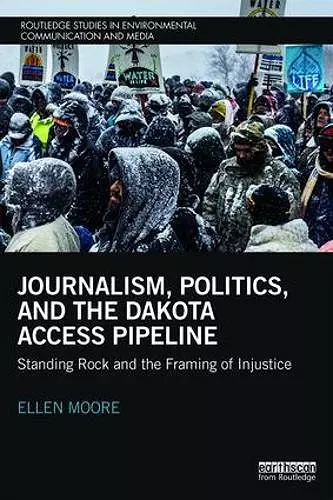Journalism, Politics, and the Dakota Access Pipeline
Standing Rock and the Framing of Injustice
Format:Paperback
Publisher:Taylor & Francis Inc
Published:20th Dec '18
Currently unavailable, and unfortunately no date known when it will be back
This paperback is available in another edition too:
- Hardback£145.00(9780815399094)

This book explores tensions surrounding news media coverage of Indigenous environmental justice issues, identifying them as a fruitful lens through which to examine the political economy of journalism, American history, human rights, and contemporary U.S. politics.
The book begins by evaluating contemporary American journalism through the lens of "deep media", focusing especially on the relationship between the drive for profit, professional journalism, and coverage of environmental justice issues. It then presents the results of a framing analysis of the Standing Rock movement (#NODAPL) coverage by news outlets in the USA and Canada. These findings are complemented by interviews with the Standing Rock Sioux Tribe, whose members provided their perspectives on the media and the pipeline. The discussion expands by considering the findings in light of current U.S. politics, including a Trump presidency that employs "law and order" rhetoric regarding people of color and that often subjects environmental issues to an economic "cost-benefit" analysis. The book concludes by considering the role of social media in the era of "Big Oil" and growing Indigenous resistance and power.
Examining the complex interplay between social media, traditional journalism, and environmental justice issues, Journalism, Politics, and the Dakota Access Pipeline: Standing Rock and the Framing of Injustice will be of great interest to students and scholars of environmental communication, critical political economy, and journalism studies more broadly.
"In this exploration of how the U.S. media covers the environment and environmental justice issues, Moore offers an insightful and compelling discussion of tensions between commercialism, journalism, and coverage of key issues that should be presented as relevant to us all. Through her examinations of our corporate-owned media, Moore presents a timely and important 'Study in Power', a meticulous, unwavering, and well-researched eye on structural weaknesses in how we receive news of our ever-increasingly vulnerable world." -- Rena Priest, Lhaq’ te’ mish author, Patriarchy Blues
"Ellen Moore provides a brilliant analysis of media coverage of the 2016 Dakota Access Pipeline protests by the Standing Rock Sioux Tribe and the 'water protectors' who were its supporters. Most relevantly, she documents the general failure of modern journalism to adequately cover environmental issues and the concerns of Indigenous peoples. In this effort, her work represents the very finest in communications scholarship." -- Michael L. Lawson, author of Dammed Indians Revisited: The Continuing History of the Pick-Sloan Plan and the Missouri River Sioux
"Moore’s penetrating study of the media’s response to the Standing Rock Sioux Tribe’s bold protests against the Dakota Access Pipeline is ultimately a profound indictment of the Fourth Estate’s unwillingness to check the greed of the fossil fuel industry or to inspire moral courage in our political leaders. Moving fluidly between first-hand accounts of Sioux leaders and illuminating lessons from the literatures on environmental justice and the political economy of the media industry, Moore reveals how the Standing Rock controversy refracts the media’s long-standing reluctance to call out environmental abuses and to shine a bright light on environmental injustices." -- Heidi M. Hurd, Ross and Helen Workman Chair in Law and Professor of Philosophy at the University of Illinois
"Engaging and informative, this book uses the lens of media studies to expertly demonstrate how questions of environmental justice, social justice and environmental ethics are tied together in the NODAPL movement. It is a must-read for academics or general readers who are interested in how media coverage can inform our opinions and values and frame agendas in ways that have far-reaching consequences." -- Jane Compson, Associate Professor, School of Interdisciplinary Arts and Sciences, University of Washington Tacoma
"Both an engaging, respectful discourse with Indigenous voices and an eviscerating critique of media's complicity in environmental degradation." --Danica Sterud Miller (Puyallup), Assistant Professor of American Indian Studies
"Moore expertly weaves through the confluence of media coverage, Big Oil, and Indigenous activism with considerable poise, in turn revealing a timely, eye-opening, and personal telling on the complexities surrounding the Dakota Access Pipeline protest and its representation throughout various media outlets." -- Miguel Douglas, Editor-in-chief of American Indian Republic
ISBN: 9780815399414
Dimensions: unknown
Weight: 362g
224 pages